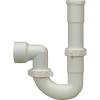What You Can Do
Talking Trash - Watch what you flush... stop flushing and start trashing! Many wastes should not be flushed down the toilet, but should be disposed of in the trash instead. Why? Flushing the wrong thing down the toilet can damage your household plumbing, hurt the environment, and create havoc within the city wastewater treatment system. Anything that isn't easily biodegradeable can not only block your sewer lines, but also the city's sewer system. Some materials are very difficult to break down at the treatment plant, which can create expensive problems. Our WWTP provides a very crucial service and we all have a stake in keeping the plant running smoothly. Additionally, for water quality reasons, please do not dump unused or expired medication down the toilet or sink.
Do Not Flush:
Oil and grease
Diaper wipes or any other wipes or cleaning cloths
Disposable diapers
Tampons, tampon tubes or mini-pads
Bandages
Cotton balls, cotton swabs
Condoms
Medications
More Tips: Prevent In-Home Odors - you can reduce odors that may be coming from your bathroom or kitchen sink. Check and watch for these things:
A "p- trap" should be located under every sink, tub and floor drain. Below is a picture of what a p-trap looks like. The bend/ trap creates a water barrier in the pipe that keeps sewer odors from coming back into your house.

Always ensure there is a p- trap, or install a p-trap. Don't make plumbing hook-ups straight into the house sewer - instead, install the curved pipe p-trap.
Periodically run water through the drains that aren't used often. Under normal use running water will keep the "p" trap full of water, and block odors from entering your home though the drain.
Make sure all plumbing vents are outside of the house. Standard plumbing code ensures proper venting.
